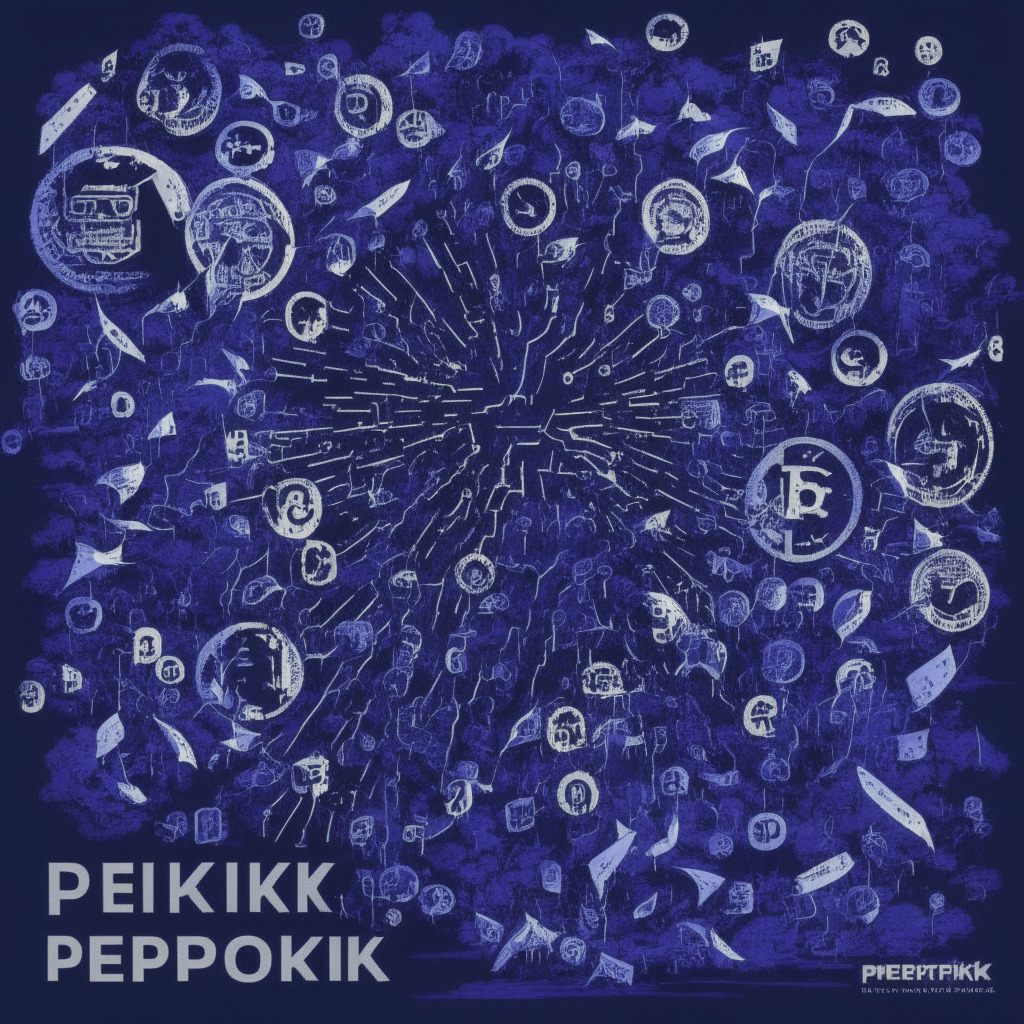“Lucky Star Currency (LSC), a Binance Smart Chain based altcoin token, has reportedly suffered a ‘rug pull’ by its developer, resulting in an estimated loss of $1.11 million and a significant decrease in its value. This event adds to a growing list of similar malicious crypto schemes, affirming reportedly shocking statistics that “12% of all Binance Smart Chain-based tokens are rug pulls.” It highlights the need for investors to exercise caution in the crypto industry.”
Search Results for: PeckShield
Blockchain’s Paradox: The Clash between Potential and Vulnerability in Light of Recent Mixin Network Hack
The recent hack on Mixin Network, resulting in a loss of approximately $200 million, highlights the vulnerability of blockchain technology. Despite its potential for speed, transparency, and security, hackers were still able to exploit weaknesses, leading to an immediate halt in withdrawals and deposits. It underscores the imperative for stronger defenses against cyber threats in blockchain technology.
Cryptocurrency Heist: A Wake-Up Call on the Need for Elevated Security Measures in the Blockchain Landscape
A suspicious withdrawal of around $2.7 million worth of cryptocurrencies from Remitano crypto exchange brought to light potential security breaches. The immediate response included Tether halting the movement of drained coins, saving a significant portion of the stolen funds. However, the security issue emphasizes the importance of vigilant security measures in the crypto landscape.
North Korean Lazarus Group’s $41M Crypto Casino Heist: A Detailed Examination
The FBI has identified North Korean hacking group, the Lazarus Group, as responsible for the theft of $41 million from online crypto casino Stake. The large-scale cyber theft affected multiple blockchain networks including Ethereum, BNB Chain, Bitcoin, and Polygon.
Whale Losses: A $24 Million Lesson in Crypto Security and Lingering Vulnerabilities
“A large cryptocurrency investor recently lost $24 million, including Lido Staked ETH and Rocket Pool ETH, due to a phishing attack. This incident underscores questions about security in cryptocurrency ecosystem. It also emphasizes the need for caution when approving ERC-20 allowances and the importance of ongoing development of security measures within the crypto industry.”
Boosting Web3 Startups: Cronos Lab’s Accelerator Program Amid Security Concerns
“Cronos Labs has launched a recruitment phase for its $100M accelerator program, aiming to support early-stage projects that promote the adoption of decentralized applications (DApps). However, this strategy can inadvertently lure scammers using government-owned website URLs to dupe victims and access their crypto wallet holdings.”
Harnessing the Power: The Intersection of AI and Cryptocurrency in Cronos Labs’ $100M Program
“Cronos Labs is looking for eight innovative crypto startups to join their $100 million accelerator program, aiming to marry artificial intelligence (AI) with crypto. Blockchain developers are leveraging the growing interest in AI to accelerate the growth of the digital economy, projecting AI and cryptocurrency as the next critical turning point.”
Suspicious Multi-Million Dollar Activity in Crypto Casino: A Potential Rug Pull Scandal?
Blockchain security firms Peckshield and Cyvers report suspicious activity involving crypto casino Stake. Around $16 million in cryptocurrencies was moved through a specific wallet and split among numerous addresses – a potential ‘rug pull’ amid falling crypto values. Concerns are now growing in the digital asset community, calling for a thorough investigation.
Unraveling the $6.5M Exit Scam: Dark Side of Decentralization or User Responsibility?
A recent event involving Magnate Finance draining users of approximately $6.5 million has raised concerns about the safety of decentralization. The anonymous founders disappeared, leading to suspicions of an exit scam. The incident resulted in a massive loss, equating to the total value locked in the protocol. Despite the perks of decentralization, its nefarious potential for scams and hacks is increasing, costing the crypto ecosystem an estimated $656 million in the first half of 2023 alone.
Decentralized Finance Protocols Exactly and Harbor Victims of Exploits: A Closer Look at Blockchain Security
The DeFi protocols Exactly and Harbor recently faced separate security breaches, resulting in a significant loss of ETH. This alarming pattern of security disruptions in the DeFi ecosystem showcases the potential vulnerabilities in the blockchain. These incidents underline the necessity for robust security protocols despite the promising future of blockchain technology.
Ethereum Layer 2 Lending Scam: SwirlLend’s Exit Raises DeFi Ecosystem Red Flags
“The Ethereum Layer 2 lending project, SwirlLend, allegedly perpetrated an exit scam, leading to user losses around $460,000. The scam was exposed by cyber-security firm PeckShield, revealing suspicious activities such as the sudden disappearance of SwirlLend’s social media presence. This incident emphasizes the ever-present risk in the DeFi ecosystem and the importance of due diligence.”
Unmasking the Zunami Protocol Price Manipulation: Over $2.1 Million Lost in Cyber-Offensive
The Decentralized Finance (DeFi) platform Zunami Protocol has suffered a price manipulation attack involving its stablecoin pools on Curve Finance, leading to potential losses of over $2.1 million. The exploit participants reportedly used a flash loan to significantly alter the price, resulting in stolen funds. The event underscores the necessity of stringent security measures for DeFi ecosystems.
Reentrancy Attack Plunders Aave Earning Farm: DeFi’s Security Dilemma Unraveled
The blockchain-driven DeFi world, particularly the Aave protocol’s Earning Farm, recently fell victim to a reentrancy attack, leading to a loss of $287,000. This attack, which mirrors previous exploits on other platforms, highlights significant security vulnerabilities in the DeFi sector.
Brawn and Bots: Perils and Potential of Today’s NFT Marketplace
A trader outsmarted a bot into buying his overpriced NFTs, gaining a lucrative 800 ETH ($1.5 million). This strategy has sparked conversations about its legal implications. Meanwhile, July saw a decrease in NFT volumes, causing concern among creators. Despite this, Gary Vaynerchuk recently entered the NFT space, partnering with Reebok.
Navigating Bitcoin’s 2023: Market Swings, Security Threats, and Cautious Optimism
Bitcoin is currently unstable due to recent U.S Federal Reserve’s lending rate hikes and a major security breach at Curve Finance affecting Ethereum pools. Despite this, experts still anticipate positive trends for bitcoin spurred by clearer global economic trends.
Unraveling the LeetSwap ETH Recovery Mission: A Wake-Up Call for Blockchain Security Improvements
“LeetSwap, a decentralized exchange, recently suffered an attack leading to a drain of 340 ETH from its liquidity provider pairs. Despite robust on-chain security measures, the incident highlighted the need for improved, foolproof safety mechanisms in blockchain transactions to prevent financial losses.”
Navigating Blockchain Security: Unpacking the Conic Finance Exploit and the Path Forward
The decentralized finance platform, Conic Finance, was recently exploited for $3.26 million in ETH via a single transaction. This incident highlights ongoing concerns about blockchain security and emphasizes the need for more sophisticated protection measures even as blockchain contracts continue to innovate and evolve.
Crypto Heist Chronicles: The $888,000 Rodeo Finance Exploit – Unraveling the Clever Labyrinth
“Rodeo Finance on the Arbitrum network lost 472 ether ($888,000) in a crypto exploit. The hacker utilized Oracle manipulation techniques to adjust price feeds and exchange stolen tokens into diverse assets, before converting them back into ether. Such incidents highlight the increasing risk and vulnerability in the DeFi domain.”
Unmasking the Chibi Finance Rug Pull: A DeFi Scam Masterclass and Wake-Up Call for Investors
The Arbitrum-based project Chibi Finance conducted a rug pull scam, stealing over $1 million worth of tokens using a malicious contract. This highlights the challenges and pitfalls in decentralized finance (DeFi) and the need for investors to exercise caution and conduct due diligence.
DeFi Exploit Costs Sturdy Finance 442 ETH: Analyzing Security and Future Safeguards
Sturdy Finance, a DeFi lending protocol, recently suffered an exploit resulting in a loss of 442 ETH (around $768,800). The platform has paused activity for investigation. The attacker allegedly manipulated the price oracle of a collateral pool, draining funds from Sturdy using a re-entrancy attack.
DeFi Protocol Exploits: Balancing Innovation with Robust Security Measures
Sturdy Finance, a decentralized finance (DeFi) protocol, recently suffered a security exploit with a loss of 442 Ether ($800,000). The vulnerability was linked to a faulty price oracle, emphasizing the need for vigilance, strengthened security measures, and continuous monitoring in the crypto space.
Cyber Attack on Jimbos Protocol: Security Collaboration & Crypto’s Ongoing Security Battle
Jimbos Protocol is collaborating with security researchers and on-chain analysts to investigate a cyber attack that exploited a loophole and resulted in a theft of ETH 4,048 (about $7.5 million). As hacking incidents increase, this event emphasizes the importance of implementing effective security measures and continuous assessments in the blockchain and cryptocurrency space.
DeFi Security Dilemma: Jimbos Protocol Hack Highlights Growing Vulnerabilities
The recent $7.5 million exploit of Arbitrum-based Jimbos Protocol highlights potential vulnerabilities in DeFi protocols and raises questions about blockchain security. Adopting stricter security measures and learning from previous breaches is essential to safeguard users’ investments and promote mass adoption of DeFi platforms.
Jimbos Protocol Hack: Analyzing Vulnerabilities & Impact on DeFi Security Measures
Jimbos Protocol, a liquidity protocol for the Arbitrum system, suffered a recent attack, leading to a loss of 4,000 ETH ($7.5 million) due to a lack of slippage control in liquidity conversions. Despite efforts to enhance security, the DeFi ecosystem still faces persistent challenges safeguarding against potential vulnerabilities and unauthorized access.
Hacking Incidents Decrease: Are Crypto Mixers Sanctions Working or Just Delaying the Inevitable?
The hacking of an older version of Yearn Finance saw the exploiter mint over 1 quadrillion Yearn Tether, resulting in $11.6 million in stolen stablecoins. Despite crypto mixer Tornado Cash sanctions, the hacker laundered nearly $9.3m worth of loot, raising concerns about the long-term effectiveness of such sanctions and the need for evolving security measures in the crypto community.
PepeDerp Craze: Unreliable Meme Coin or Hidden Gem? Pros, Cons & Safer Alternatives
Meme coin PepeDerp raises concerns about its reliability due to its smart contract’s potential risks and lack of audits or whitepapers. Meanwhile, alternative meme coin investments like AiDoge, Ecoterra, and yPredict offer genuine utility and unique features. Conduct thorough research before investing.
Meme Coin Mania: How Scammers Profit and Lessons for Investors
The crypto market has seen a surge in meme coin popularity, leading to scammers creating fake tokens and duping investors out of millions. Research by PeckShieldAlert shows a significant increase in meme coin rug pulls, highlighting the potential risks associated with the crypto market. It’s crucial to maintain skepticism, conduct thorough research, and remain well-informed about emerging trends and risks to avoid falling victim to fraudulent schemes.
Swaprum Scandal: Balancing Trust, Transparency, and Decentralization in Crypto
The recent Swaprum exit scam on Ethereum Layer 2 network Arbitrum reveals the ongoing security challenges in the crypto world. This incident highlights the importance of credible security audits, regulatory framework, and user education in addressing growing concerns about hacks, scams, and the future of cryptocurrencies.
Rise of PEPE Memecoin: Attracting Investors and Fraudsters Alike
As PEPE memecoin’s popularity grows, security firms have observed a rise in scams and fraudulent activities involving meme coins. Investors must be cautious, distinguishing between genuine opportunities and scams, while remaining vigilant as the crypto market continues to expand.
DeFi Protocol DEUS Finance Suffers $6M Hack: The Recovery Efforts and Security Lessons Learned
DEUS Finance, a decentralized finance protocol, experienced a security breach resulting in a loss of over $6 million. The hack, initiated through a vulnerability in stablecoin DEI, affected BNB Smart Chain and Arbitrum networks. Since then, a sizable portion of the funds has been recovered.
DeFi Security Breach: $6 Million Loss Exposes Vital Need for Robust Protocols
The recent security incident involving DeFi protocol DEUS saw a loss of over $6 million, impacting its stablecoin DEI, due to an attacker exploiting vulnerabilities in the BNB Smart Chain and Arbitrum network. This highlights the need for robust security measures, addressing vulnerabilities, and securing user funds in decentralized finance systems to maintain trust and realize their potential.
WSB Coin Scandal Unmasked: The Risks and Protective Mechanisms in the Meme Coin Space
The suspicious activity involving WSB Coin has led to an 85% value plummet, raising concerns about security and transparency in token distribution. However, swift detection showcases the crypto community’s vigilance and blockchain technology’s power, emphasizing the need for robust security measures and vigilance in the evolving crypto ecosystem.































